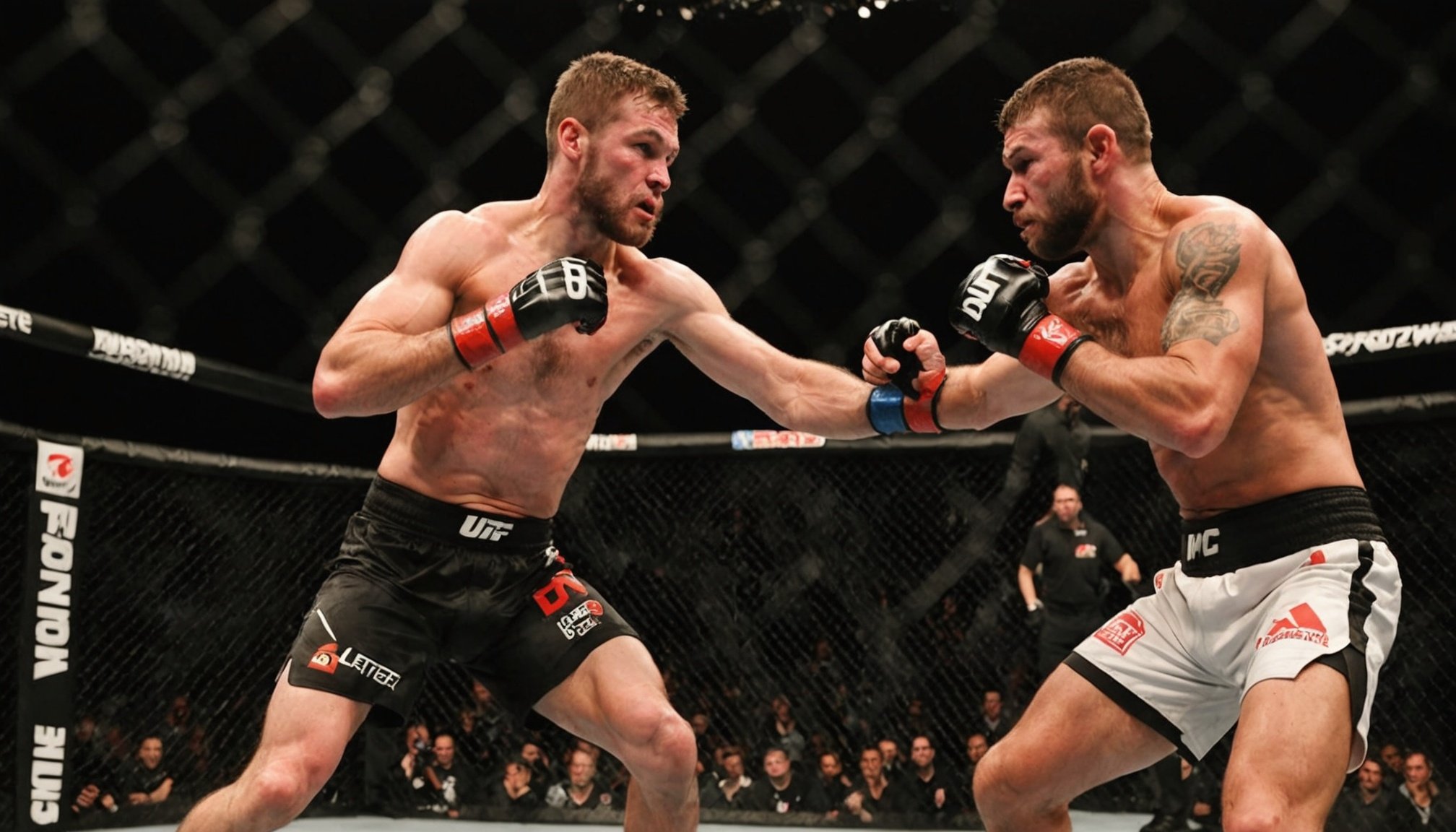Immediate economic impact of MMA events in the UK
Mixed martial arts UK events generate significant economic impact through diverse revenue streams, making them valuable contributors to the local economy. Event ticket sales are a primary source of income, attracting thousands of fans eager to experience live bouts, directly boosting venue earnings. Merchandise sales, including apparel and memorabilia, further enhance revenue, leveraging fans’ enthusiasm for the sport.
Broadcast rights form another critical financial pillar, with TV and streaming services paying substantial fees to showcase MMA matches nationwide. These deals not only increase the sport’s visibility but also funnel essential funds back into the MMA industry UK ecosystem.
In the same genre : Revving up the tachiai: creative strategies for uk sumo wrestlers to enhance their opening charge techniques
Local venues and service providers, such as hotels, restaurants, and transportation companies, benefit from heightened activity during events. This influx creates temporary jobs and increases spending, stimulating the surrounding community.
Recent UK MMA industry statistics reveal event revenues reaching millions per event, with consistent growth trends reflecting a booming market. For example, top-tier shows routinely report ticket sales surpassing tens of thousands, while broadcast contracts add further multi-million-pound income streams. These combined financial figures underscore mixed martial arts UK’s expanding role as a dynamic economic driver.
In the same genre : How do UK combat sports impact youth development and community engagement?
Job Creation and Employment Opportunities
MMA events play a significant role in job creation UK, offering both temporary and permanent employment across multiple sectors. During large MMA events, there is a surge in demand for skilled professionals in sports event staffing, covering critical roles such as security personnel, hospitality workers, logistics coordinators, and media teams.
For instance, a major UK MMA event can generate hundreds of jobs, contributing substantially to the local economy. Security staff ensure crowd safety, while hospitality teams manage concessions and VIP areas. Logistics experts coordinate transportation and equipment setup, vital for seamless event execution. Meanwhile, media professionals handle broadcasting and promotion, amplifying the event’s reach.
Event management careers linked to MMA provide opportunities to develop versatile skills in high-pressure environments. Some roles are seasonal, aligning with event schedules, but others can turn into permanent positions as the sport grows in popularity. This employment spectrum highlights MMA’s capacity to support a diverse workforce while fueling the expanding sports and entertainment industry in the UK.
Influence on tourism and hospitality sectors
The rise of MMA tourism UK significantly boosts local economies by attracting both domestic and international visitors. Major MMA events generate surges in visitor spending, benefiting hotels, restaurants, and transportation services. For example, during high-profile MMA weekends, hotel occupancy rates often spike, sometimes reaching full capacity. This influx directly supports the local hospitality industry, from casual dining spots to upscale venues.
Visitors attending these events tend to spend on multiple fronts: accommodation, food, transportation, and entertainment. This diversified spending helps stabilize revenues across various sectors. Importantly, the increased footfall encourages longer stays, further amplifying economic benefits.
Local businesses often report heightened activity during event weekends, with some identifying MMA tourism UK as a catalyst for repeat visits. Such events create vibrant atmospheres that promote exploration beyond just the fights, strengthening ties between tourism and hospitality sectors. Therefore, MMA tourism UK represents not just a sporting phenomenon, but a substantial contributor to the overall visitor economy.
Local business growth and sponsorship opportunities
Supporting local businesses in the UK through MMA event sponsorship unlocks mutually beneficial prospects. Small shops, restaurants, and vendors often see direct increases in foot traffic and sales when partnering with fight nights or tournaments. These collaborations shine a spotlight on local services and products, connecting enthusiastic audiences to community offerings.
Event sponsorship encourages local and national brands to join forces with MMA promotions. National brands gain grassroots exposure, while local enterprises enjoy credibility boosts by association. Developing MMA partnerships means access to targeted audiences passionate about sport, fitness, and entertainment.
For example, a local gym supplying training gear or an independent restaurant sponsoring fighter meals not only enjoys immediate sales growth but also long-term brand recognition. This strategic engagement helps small businesses establish footholds in competitive markets through sport-centric community involvement.
In sum, event sponsorship for local businesses in the UK is more than marketing—it is part of a growth strategy. The financial injection from deals bolsters small business benefits, while fostering symbiotic relationships with MMA promoters that elevate visibility and customer loyalty. This synergy highlights the economic potential for grassroots businesses fueling MMA’s increasing popularity.
Contribution to government revenue and community projects
The tax revenue UK gains from Mixed Martial Arts (MMA) events comes primarily through ticket sales, business profits, and related consumer spending. Each ticket sold generates Value Added Tax (VAT), while businesses involved—ranging from venues to merchandise sellers—contribute through corporate taxes. Additionally, local hotels, restaurants, and transport services benefit, indirectly boosting government revenue.
Beyond taxation, MMA events stimulate economic development UK by attracting visitors who spend on accommodations and leisure, promoting regional growth. This inflow supports job creation and small businesses, strengthening the local economy.
Crucially, part of the revenue often supports MMA community funding, financing grassroots programs, youth training, and health initiatives. This reinvestment fosters community wellbeing and helps nurture future talent.
When compared to government revenue from other major sports, MMA events hold a growing, though still niche, position. Their compact scale and dedicated fan base mean contributions are substantial locally, complementing broader national sports income. This balance highlights the sport’s potential as both an economic and social asset.
Expert insights and economic analysis of MMA’s role
Sports economics UK experts often highlight the growing significance of MMA’s economic impact within the broader sports industry. According to economic studies, MMA generates substantial revenue through ticket sales, pay-per-view events, merchandise, and sponsorship deals. Experts agree that the sport’s rapid expansion contrasts with more established sports, positioning MMA as an increasingly lucrative sector.
When comparing MMA to football or boxing, economic analyses reveal distinct patterns. While football dominates in overall revenue and global reach, MMA often boasts higher pay-per-view numbers per event, reflecting intense fan engagement. Boxing, traditionally a lucrative combat sport, shows similarities to MMA but with a slower growth trajectory recently. These comparative insights help stakeholders understand MMA’s unique position in the UK sports economy.
To maximize future benefits, expert opinion MMA advocates for strategic investments in athlete development, enhanced broadcasting rights, and community engagement initiatives. Economic studies emphasize integrating these best practices to sustain and boost MMA’s contribution to sports economics UK. This approach ensures that MMA can continue to grow competitively while delivering lasting economic value.






